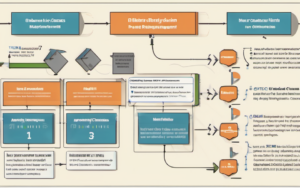The world of technology is constantly evolving, and one of the most significant shifts we’re witnessing is the rise of blockchain startups. These innovative companies are leveraging the power of blockchain technology to disrupt traditional industries and create entirely new possibilities, impacting everything from finance to supply chain management. Understanding the current landscape and future potential of blockchain startups is crucial for anyone interested in the future of technology.
1. Introduction
1.1 The Rise of Blockchain Technology
Blockchain technology, initially conceived as the foundation for Bitcoin, has rapidly matured beyond its cryptocurrency origins. Its core principles—decentralization, transparency, and immutability—have proven incredibly valuable across diverse sectors. The distributed ledger technology allows for secure and transparent record-keeping, fostering trust and efficiency in ways previously unimaginable. This fundamental shift has paved the way for a wave of innovation, driving the emergence of numerous blockchain startups.
This decentralized nature is a key factor driving the growth of blockchain startups. Unlike traditional centralized systems controlled by a single entity, blockchains operate on a network of computers, making them more resilient to censorship and single points of failure. This inherent security and transparency are attracting both investors and developers, fueling the rapid growth of the blockchain ecosystem.
1.2 Blockchain Startups: A Driving Force
Blockchain startups are at the forefront of this technological revolution, developing and implementing innovative applications of blockchain technology. They’re not just building cryptocurrencies; they’re creating solutions for real-world problems across various industries. From streamlining supply chains to revolutionizing finance, the impact of blockchain startups on the tech industry is undeniable. Understanding the innovative solutions being developed by these startups is key to grasping the transformative potential of this technology. The impact of blockchain startups on the tech industry is vast and continues to evolve.
2. Disruptive Innovations by Blockchain Startups
2.1 Decentralized Finance (DeFi)
Decentralized finance (DeFi) is arguably one of the most exciting areas where blockchain startups are making a significant impact. DeFi aims to recreate traditional financial services in a decentralized and transparent manner, cutting out intermediaries and empowering users.
2.1.1 Lending and Borrowing Platforms
DeFi platforms offer lending and borrowing services without the need for traditional banks. Users can lend their crypto assets to earn interest or borrow against their holdings, all through smart contracts running on a blockchain. This eliminates the need for intermediaries and allows for faster and more efficient transactions. This innovative approach to lending and borrowing is reshaping the financial landscape.
2.1.2 Decentralized Exchanges (DEXs)
Decentralized exchanges (DEXs) provide a platform for trading cryptocurrencies without relying on centralized exchanges. This enhances security and transparency while empowering users with more control over their assets. DEXs are increasingly popular due to their inherent security and user control. This has been a major driver of the rise of blockchain startups in the DeFi space.
2.1.3 Yield Farming and Staking
Yield farming and staking are two popular DeFi activities that allow users to earn passive income by providing liquidity to decentralized exchanges or staking their crypto assets to secure the network. These activities have contributed significantly to the growth of the DeFi ecosystem and the popularity of blockchain startups. The future of blockchain technology in startups is heavily reliant on the continued growth and innovation within the DeFi space.
2.2 Non-Fungible Tokens (NFTs) and the Creator Economy
Non-fungible tokens (NFTs) represent unique digital assets, opening new possibilities for creators and collectors. Blockchain startups are at the forefront of developing and utilizing NFT technology, transforming the creator economy.
2.2.1 Digital Art and Collectibles
NFTs have revolutionized the digital art world, allowing artists to sell and verify ownership of their digital creations. This creates new revenue streams for artists and provides collectors with verifiable proof of ownership. This is a prime example of how blockchain startups are disrupting traditional businesses.
2.2.2 NFTs in Gaming and Metaverse
NFTs are being integrated into gaming and metaverse platforms, creating unique in-game assets and virtual real estate. This creates new opportunities for players to earn and own virtual items. The best blockchain startup investment opportunities often lie in companies at the forefront of these emerging applications.
2.2.3 Tokenized Assets and Intellectual Property
NFTs can be used to represent ownership of physical or digital assets, including intellectual property. This allows for secure and transparent tracking of ownership and facilitates easier transfer of assets. This is transforming the way businesses manage their assets and intellectual property.
2.3 Supply Chain Management and Transparency
Blockchain technology is proving incredibly valuable in improving supply chain management, enhancing transparency, and combating counterfeiting. Blockchain startups are developing solutions that provide end-to-end tracking of goods.
2.3.1 Tracking Goods from Origin to Consumer
Blockchain allows for the tracking of goods from origin to consumer, providing real-time visibility into the supply chain. This enhances transparency and accountability, improving efficiency and trust throughout the process. This level of transparency significantly reduces the risk of fraudulent activities within the supply chain.
2.3.2 Enhancing Supply Chain Security
Blockchain’s immutable nature enhances supply chain security, making it more difficult to tamper with records or introduce counterfeit products. This is particularly valuable in industries with high levels of counterfeiting or fraud. How blockchain startups are disrupting traditional businesses is clearly demonstrated in the supply chain sector.
2.3.3 Reducing Counterfeiting and Fraud
By providing a secure and transparent record of goods, blockchain technology helps reduce counterfeiting and fraud in various industries. This increases consumer trust and protects brand reputation. This transparency helps companies build stronger relationships with their customers.
3. Challenges Faced by Blockchain Startups
While the potential of blockchain startups is immense, they also face several challenges. Addressing these challenges is crucial for the continued growth and success of the industry.
3.1 Scalability and Transaction Speed
Many blockchain networks struggle with scalability and transaction speed, limiting their ability to handle large volumes of transactions. Improving scalability is a crucial challenge that blockchain startups must address for mass adoption.
3.2 Regulatory Uncertainty and Compliance
The regulatory landscape surrounding blockchain technology is still evolving, creating uncertainty for startups. Navigating regulatory requirements and ensuring compliance is a significant challenge. Regulatory uncertainty is a major obstacle to the growth of blockchain startups.
3.3 Security Concerns and Vulnerability
While blockchain technology is inherently secure, vulnerabilities can exist in smart contracts and other applications. Ensuring the security of blockchain applications is crucial to maintain user trust. Security concerns remain a major hurdle for many blockchain startups.
3.4 Talent Acquisition and Development
The blockchain industry faces a shortage of skilled developers and professionals. Attracting and retaining top talent is essential for the continued growth of blockchain startups. Talent acquisition is a key challenge for the growth of the blockchain startup industry.
4. The Future of Blockchain Startups
The future of blockchain startups is bright, with several emerging trends and technologies promising to further revolutionize various industries. The potential for mass adoption is significant, and the impact on various industries will be transformative.
4.1 Emerging Trends and Technologies
Emerging technologies such as layer-2 scaling solutions, improved consensus mechanisms, and interoperability protocols are addressing some of the challenges currently faced by blockchain startups. These advancements will pave the way for greater adoption and broader applications of blockchain technology.
4.2 Potential for Mass Adoption
As blockchain technology matures and becomes more user-friendly, its potential for mass adoption increases. This will lead to a wider range of applications and a greater impact on various industries. The future of blockchain technology in startups hinges on its potential for widespread adoption.
4.3 Impact on Various Industries
Blockchain startups are poised to transform various industries, including finance, healthcare, supply chain management, and digital identity. The applications are virtually limitless, and the potential for innovation is immense. The impact of blockchain startups on the tech industry will continue to grow exponentially.
The continued growth and innovation within the blockchain startup ecosystem will undoubtedly shape the future of technology. Addressing the existing challenges, fostering collaboration, and embracing emerging trends are all critical to unleashing the full potential of blockchain technology and its transformative impact on our world. Investing in blockchain startups presents significant opportunities for those seeking exposure to this rapidly evolving sector, but thorough due diligence is always recommended.




